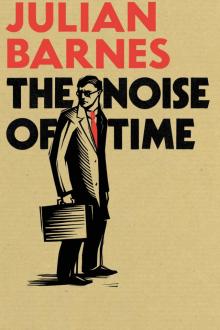- Home
- Julian Barnes
The Only Story Page 12
The Only Story Read online
Page 12
“Wanted to make sure. And she changed her tactics.”
“How do you mean?”
“Well, at some point she must have noticed that there was a mark on the bottle. She’d have her nip or glug or however much it was, and then fill the bottle back up to the mark with water.”
“That’s clever.”
“No, it’s standard. Banal, even. My dad used to do that when my mum was trying to get him to stop.”
“Oh.” I was disappointed. I wanted Susan always to be as entirely original as she still appeared to me.
“So I did the logical thing. I stopped drinking from the bottle myself. She’d come up, have a swig, fill up to the pencil mark with water. I let it run and run, until I could see the colour of the whisky fading. Eventually, to confirm it, I had a glass myself. One part whisky to about fifteen of water would be my guess.”
“Fuck.”
“Yes, fuck.”
“I’ll have a word with her,” I promised.
But I didn’t. Was it cowardice, the hope that some alternative explanation might present itself, or a weary refusal to admit my own suspicions?
“And in the meantime, I’ll keep my booze on top of the wardrobe.”
“Good plan.”
It was a good plan, until the day when Eric said quietly,
“She’s learned to climb up to the top of the wardrobe.”
He made it sound like a kind of monkey trick rather than a normal piece of behaviour involving a chair. But that’s how it felt to me too.
* * *
—
You notice there are times when she seems, not squiffy, but out of focus. Not bleary of face, but bleary of mind. Then, by chance, you notice her swallowing a pill.
“Headache?”
“No,” she replies. She is in one of those moods—lucid, unselfpitying, yet somehow beaten-down—which bend your heart painfully. She comes and sits on the edge of the bed.
“I went to the doctor. I explained what had happened. I explained that I’d been feeling depressed. He gave me some cheering-up pills.”
“I’m sorry you need them. I must be letting you down.”
“It’s not you, Paul. And it’s not fair on you either. But I think if I can get through the…adjustment, then it’ll get better.”
“Did you tell him you were drinking a bit too much?”
“He didn’t ask about that.”
“That doesn’t mean you shouldn’t have told him.”
“We’re not going to quarrel about this, are we?”
“No. We’re not going to quarrel. Ever.”
“Then it’ll all come out right. You’ll see.”
Thinking about this conversation later, you begin to understand—for the first time, really—that she has more to lose than you. Much more. You are leaving behind a past, much of which you are happy to let go. You believed, and still believe as deeply, that love is the only thing that counts; that it makes up for everything; that if you and she get it right, everything will fall into place. You realise that what she has left behind—even her relationship with Gordon Macleod—is more complicated than you had assumed. You thought chunks could be cleanly amputated from a life without pain or complication. You realise that, if she had seemed isolated in the Village when you first met her, you have made her more isolated by taking her away.
All this means that you must redouble your commitment to her. You must get through this tricky patch, and then things will become clearer, better. She believes that, and so you must believe it too.
* * *
—
You take the back route as you approach the Village, to avoid passing your parents’ house.
“Where’s Susan?” are Joan’s first words as she opens the door.
“I’ve come by myself.”
“Does she know?”
You like the way Joan always gets straight to the point. You quite enjoy having cold water dashed in your face before sitting down with a streaky tumbler full of room-temperature gin.
“No.”
“Then it must be serious. I’ll shut the little yappers up.”
You sink into a dog-scented armchair and a drink is put next to you. As you are gathering your thoughts, Joan gets in first.
“Point One. I’m not a go-between. Whatever you say stays in this room and it doesn’t get leaked back. Point Two. I’m not a shrink, I’m not some kind of advice centre, I don’t even much like listening to other people’s woes. I tend to think they should get on with it, stop moaning, roll up their sleeves and all of that. Point Three. I’m just an old soak whose life hasn’t worked out and who lives alone with her dogs. So I’m not an authority on anything. Not even crosswords, as you once pointed out.”
“But you love Susan.”
“Course I do. How is the dear girl?”
“She’s drinking too much.”
“How much is ‘too much’?”
“In her case, anything at all.”
“You may be right.”
“And she’s on antidepressants.”
“Well, we’ve all been there,” says Joan. “Doctors hand them out like Smarties. Especially to women of a certain age. Do they do any good?”
“I can’t tell. They just make her woozy. But a different kind of woozy from what the drink does.”
“Yes, I remember that too.”
“So?”
“So what?”
“So what should I do?”
“Paul, dear, I’ve just told you I don’t give advice. I took my own advice for so many years and look where it got me. So I don’t do that anymore.”
You nod. You aren’t too surprised either.
“The only advice I’d give you…”
“Yes?”
“…is have a swig of what’s at your elbow.”
You obey.
“OK,” you say. “No advice. But…I don’t know, is there something that I ought to know and don’t? Something you can tell me about Susan, or about Susan and me, that would help?”
“All I can say is that if everything goes belly-up and pear-shaped, you’ll probably get over it and she probably won’t.”
You are shocked.
“That’s not a very kind thing to say.”
“I don’t do kind, Paul. Truth isn’t kind. You’ll find that out soon enough as life kicks in.”
“It feels as if it’s kicked in pretty hard already.”
“That may be all to the fucking good.” Your face must look as if it’s just taken a slap. “Come on, Paul, you didn’t come all the way down here so that I’d give you a hug and tell you there are fairies at the bottom of the garden.”
“True. Just tell me your thoughts on this. Susan goes back to see Macleod every so often. Probably more than she says.”
“Does that trouble you?”
“Mainly in the sense that if he ever lays a finger on her again, I’m going to have to kill him.”
She laughs. “Oh, I do so miss the melodrama of being young.”
“Don’t patronise me, Joan.”
“I’m not patronising you, Paul. Of course you’d do no such thing. But I admire you for the thought.”
You wonder if she is being satirical. But Joan doesn’t do satire.
“Why don’t you think I would?”
“Because the last murder in the Village was probably committed by someone wearing woad.”
You laugh, and take another sip of gin. “I’m worried,” you say. “I’m worried that I shan’t be able to save her.”
She doesn’t reply, and this annoys you.
“So what do you think about that?” you demand.
“I told you I’m not a fucking oracle. You might as well read your horoscope in the Advertiser & Gazette. I said when yo
u ran away together, you’ve got guts, the pair of you. You’ve got guts, and you’ve got love. If that isn’t good enough for life, then life isn’t good enough for you.”
“Now you are sounding like an oracle!”
“Then I’d better go and wash my mouth out with soap.”
* * *
—
One day, you return to find her with cuts and bruises to her face, and her arms held defensively against her.
“I fell over that step in the garden,” she says, as if it were a known hazard you had previously discussed. “I’m getting very trippy, I’m afraid.”
She is indeed getting “trippy.” Nowadays, as a reflex, you take her arm as you walk with her and keep watch for uneven pavements. But she also has a giveaway flush to her face. You call the doctor—not the private one she went to for her cheering-up pills.
Dr. Kenny is a fussy, inquisitive middle-aged man, but the right sort of GP—one who believes that house calls provide useful background when it comes to diagnosis. You take him upstairs to Susan’s bedroom; her bruises are coming into full colour.
Downstairs again, he asks for a few words.
“Of course.”
“It’s rather puzzling,” he begins. “It’s unusual for a woman of her age to take a fall.”
“She’s been getting very trippy lately.”
“Yes, that’s the word she used to me. And, if I may ask, you are…?”
“I’m her lodger…no, more than that, kind of godson, I suppose.”
“Hmm. And it’s just the two of you here?”
“There are two more lodgers in the attic rooms.” You decide not to promote Eric to the status of second godson.
“Does she have family?”
“Yes, but she’s kind of…estranged from them at the moment.”
“So she has no support? Except for you, that is?”
“I suppose not.”
“As I say, it’s rather puzzling. Do you think there was drink involved?”
“Oh no,” you say swiftly, “she doesn’t drink. She hates the stuff. That’s one of the reasons she left her husband. He’s a drinker. Flagons and gallons,” you add, without being able to stop yourself.
You realise two things. First, that you lie automatically to protect Susan—even if the truth might have helped her more. You also begin to see how your relationship, or rather, your cohabitation, might appear to an outsider.
“So, if I may ask, what does she do all day?”
“She…does some volunteer work for the Samaritans.” This isn’t true either. Susan has mentioned the idea; though you are against it. You think she shouldn’t try to start helping others when she is the one needing help.
“That’s not much, is it?”
“Well, I suppose she…keeps house.”
He looks around. The place is clearly in a mess. You realise that he is finding your answers inadequate. And why shouldn’t he?
“If it happens again, we’ll be obliged to investigate,” he says. Then picks up his bag and leaves.
Investigate? you think. Investigate? He can tell you’ve been lying. But investigate what? Perhaps he guesses you are her lover, and suspects you might have been beating her up. Christ to that, you think: in your desire to protect her from being thought a drinker, you seem to be opening yourself up to a charge of assault. Perhaps he was giving you a final warning.
Not that the police would necessarily be interested. You remember an incident from a year or two before. You are in the car with Susan and have scarcely gone a quarter of a mile when you notice a couple rowing on the pavement. As you see the man bearing down on the woman you have flashbacks to the Macleod household. He is not exactly hitting her, but looks about to do so. Maybe they are drunk, you can’t tell. You wind down the window and the woman yells, “Call the police!” Now he is holding her. “Call the police!” You speed home, dial 999, and are picked up by a patrol car which takes you to the scene of the reported possible crime. The couple have moved on, but you soon track them down a couple of streets away. They are ten yards apart, bellowing obscenities at one another.
“Oh, we know them,” says the young constable. “It’s just a domestic.”
“Aren’t you going to arrest him?”
The two of you are probably about the same age, but he knows he has seen more of life than you have.
“Well, sir, it’s not our policy to interfere in domestics. I mean, not unless it really kicks off. They’re just having a bit of a barney by the looks of it. Friday night, after all.”
And then he drives the two of you home.
You realise that you want official interference into other people’s lives but not into your own. You also realise that your truthfulness has become dangerously flexible. And you wonder if you should have got out of the car and tried to pull the man away from the woman.
* * *
—
One of your problems is this: for a long time it remains inconceivable to you that she is a drinker. How could she be, given that her husband is a drinker, and drink disgusts her? She hates even the smell of it, as she hates the bogus emotions it sets off in people. It makes Macleod coarser, angrier, more crudely sentimental; when he grabbed her hair and forced a glass to her lips, she would rather the sherry went down her dress than her throat. Nor has anyone in her life ever offered a credible counterexample: alcohol as glamorous, as usefully disinhibiting, as fun, as something you can control, knowing when to give the stuff its hour and when to refuse it.
You believe her. You never query her increasing lapses and latenesses. When you come in to find her blank-faced and bleary, you tell yourself that she has mistakenly swallowed an extra cheering-up pill—which is sometimes the case. And because you inevitably believe that one of the reasons she is on antidepressants is because you are failing to make her so happy that she doesn’t need them, you feel guilty, and this guilt forbids you from questioning her. So when, out of her bleariness, she looks up, pats the sofa beside her, and asks,
“Where’ve you been all my life?”
you feel a ripping and a tearing inside you, and there is nothing you want more in the world than to make everything all right for her, and on her own terms, not yours. So you sit down next to her and take her wrists.
Just as you believe your love to be unique, you believe your problems—her problems—to be unique. You are too young to understand that all human behaviour falls into patterns and categories and that her—your—case is far from unique. You want her to be some kind of exception, rather than any kind of rule. If anyone had ventured such a word as codependency to you back then—assuming the term had even been invented—you would have laughed it off as American jargon. However, you might have been more impressed by a statistical linkage of which you were then unaware: that the partners of alcoholics, far from being repulsed by the habit—or rather, despite being repulsed by the habit—frequently succumb to it themselves.
But the next stage for you is to accept a percentage of the evidence in front of your eyes. You understand that in certain, very limited circumstances, she needs the small lift of a small drink—as she now occasionally admits. Obviously, she has to keep Joan company when she goes to the Village; obviously, she’s sometimes frightened by the increasing traffic on the roads, and by that sudden twisty climb over the hills, so a little nip helps her; obviously, she is sometimes very lonely when you’re away at college for most of the day. She also has “my bad time,” as she calls it—usually between five and six in the evening, though as the days draw in and dusk falls earlier, so her bad time accordingly starts earlier, and obviously, extends just as late as it did before.
You believe what she says. You believe that the bottle she keeps beneath the sink, behind the bleach and washing-up liquid and silver polish, is the only bottle she drinks from. When she suggests that you put a penci
l mark on the bottle so you can both monitor how much she drinks, you are heartened, and think these pencil marks are quite different from the ones on Eric’s whisky bottle. Nor do you imagine there are other bottles elsewhere. When friends try to tip you off—“I’m a bit worried about Susan’s drinking,” says one, and “Boy, you could smell the booze from the other end of the phone,” says another—you react in various ways. You protect her by denying it; you admit there are occasional lapses; you say the two of you have talked about it and she has promised “to see someone.” You may even say all three things in the course of a single conversation. But you will also be offended by your friends’ attempted helpfulness. Because you do not need help: the two of you, since you love one another, will be able to sort the matter out, thank you very much. And this slightly alienates your friends, and also alienates them from her. Increasingly, you find yourself saying, “She was just having a bad day,” and you believe it yourself by dint of repetition.
Because there are still many good hours, and good days, when sobriety and cheerfulness fill the house, and her eyes and smile are just as they were when you first met, and you do something simple like drive for a walk in the woods, or go to the cinema and hold hands, and a sudden rush of feeling tells you it is all very easy and straightforward, and then your love is reaffirmed, yours for her, hers for you. And you wish you could display her to your friends at times like this: look, she is still herself, not just “underneath,” but here, now, on the surface too. You never suspect that one reason your friends tend to see her half-cut might be because she has persuaded herself, by some tortuous argument, that she needs a little Dutch courage before facing them.
Each stage rolls seamlessly into the next. And here comes a paradoxical one that you initially struggle with. If you love her, as you unwaveringly do, and if loving her means understanding her, then understanding her must include understanding why she is a drinker. You run through all her prehistory, and recent history, and current situation, and possible future. You understand all this, and before you know where you are, you have passed somehow from total denial of the fact that she drinks to total comprehension of why she might do so.

 The Sense of an Ending
The Sense of an Ending The Noise of Time
The Noise of Time Metroland
Metroland Letters From London
Letters From London Before She Met Me
Before She Met Me Pulse
Pulse Flaubert's Parrot
Flaubert's Parrot England, England
England, England The Porcupine
The Porcupine The Only Story
The Only Story Love, Etc
Love, Etc Through the Window: Seventeen Essays and a Short Story
Through the Window: Seventeen Essays and a Short Story Staring at the Sun
Staring at the Sun Cross Channel
Cross Channel Levels of Life
Levels of Life Arthur & George
Arthur & George Love, Etc.
Love, Etc. A History of the World in 10 1/2 Chapters
A History of the World in 10 1/2 Chapters Something to Declare
Something to Declare Through the Window: Seventeen Essays and a Short Story (Vintage International)
Through the Window: Seventeen Essays and a Short Story (Vintage International)